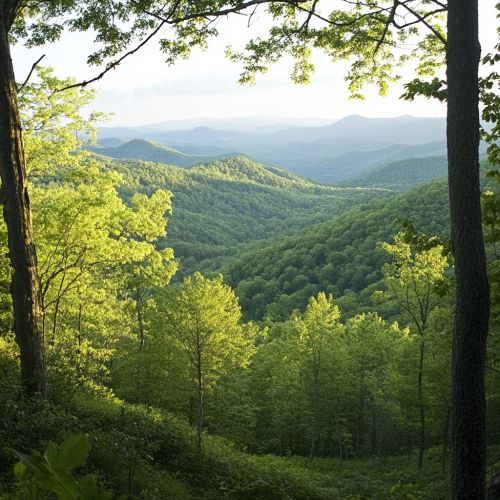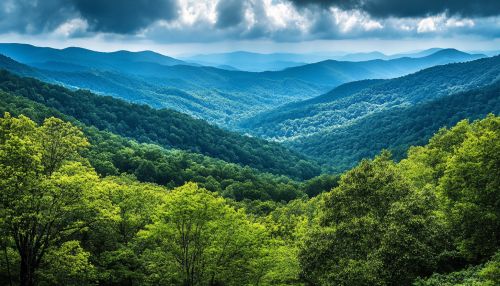History of the Appalachian people: Difference between revisions
(Created page with "== Introduction == The history of the Appalachian people is a rich tapestry woven from the threads of diverse cultures, historical events, and geographical influences. The Appalachian region, stretching from the southern tier of New York to northern Alabama, Mississippi, and Georgia, is characterized by its rugged terrain and distinct cultural identity. This article delves into the complex history of the Appalachian people, exploring their origins, cultural evolution, s...") |
No edit summary |
||
| Line 7: | Line 7: | ||
The earliest known inhabitants of the Appalachian region were the Native American tribes, including the Cherokee, Shawnee, and Iroquois. These indigenous peoples developed complex societies with distinct languages, customs, and governance structures. The [[Cherokee|Cherokee Nation]], for example, was known for its sophisticated political system and agricultural practices. Archaeological evidence suggests that these tribes engaged in extensive trade networks, exchanging goods such as flint, copper, and shells. | The earliest known inhabitants of the Appalachian region were the Native American tribes, including the Cherokee, Shawnee, and Iroquois. These indigenous peoples developed complex societies with distinct languages, customs, and governance structures. The [[Cherokee|Cherokee Nation]], for example, was known for its sophisticated political system and agricultural practices. Archaeological evidence suggests that these tribes engaged in extensive trade networks, exchanging goods such as flint, copper, and shells. | ||
[[Image:Detail-98357.jpg|thumb|center|Scenic view of the Appalachian Mountains with lush green forests and rolling hills.|class=only_on_mobile]] | |||
[[Image:Detail-98358.jpg|thumb|center|Scenic view of the Appalachian Mountains with lush green forests and rolling hills.|class=only_on_desktop]] | |||
== European Colonization == | == European Colonization == | ||
Latest revision as of 08:45, 9 October 2024
Introduction
The history of the Appalachian people is a rich tapestry woven from the threads of diverse cultures, historical events, and geographical influences. The Appalachian region, stretching from the southern tier of New York to northern Alabama, Mississippi, and Georgia, is characterized by its rugged terrain and distinct cultural identity. This article delves into the complex history of the Appalachian people, exploring their origins, cultural evolution, socio-economic challenges, and contributions to American society.
Early Inhabitants
The earliest known inhabitants of the Appalachian region were the Native American tribes, including the Cherokee, Shawnee, and Iroquois. These indigenous peoples developed complex societies with distinct languages, customs, and governance structures. The Cherokee Nation, for example, was known for its sophisticated political system and agricultural practices. Archaeological evidence suggests that these tribes engaged in extensive trade networks, exchanging goods such as flint, copper, and shells.


European Colonization
The arrival of European settlers in the 16th and 17th centuries marked a significant turning point in the history of the Appalachian people. The Spanish, French, and English explorers sought to exploit the region's resources and establish trade routes. The Proclamation of 1763, issued by the British Crown, attempted to limit colonial expansion westward, but settlers continued to encroach on Native American lands, leading to conflicts and displacement.
The Scotch-Irish and German immigrants were among the first European settlers to establish permanent communities in the Appalachian region. They brought with them distinct cultural traditions, including music, dance, and crafts, which have become integral to Appalachian identity. These settlers adapted to the challenging terrain by developing subsistence farming practices and utilizing the abundant natural resources.
Cultural Development
The cultural development of the Appalachian people is a testament to their resilience and adaptability. The isolation imposed by the mountainous terrain fostered a unique cultural identity, characterized by a strong sense of community and self-reliance. Traditional Appalachian music, with its roots in Celtic and African influences, has played a crucial role in shaping the region's cultural landscape. Instruments such as the banjo and fiddle became staples of Appalachian music, giving rise to genres like bluegrass and old-time music.
Folklore and oral traditions have also been pivotal in preserving the history and values of the Appalachian people. Stories of legendary figures like Daniel Boone and Davy Crockett have become emblematic of the frontier spirit and the struggle for survival in a harsh environment.
Economic Challenges
The Appalachian region has historically faced significant economic challenges, stemming from its geographical isolation and reliance on extractive industries. The discovery of coal in the 19th century brought an influx of investment and labor, transforming the region's economy. However, the coal industry's boom-and-bust cycles have left lasting impacts, including environmental degradation and economic instability.
The Great Depression exacerbated these challenges, leading to widespread poverty and unemployment. In response, the federal government implemented initiatives such as the Tennessee Valley Authority and the Appalachian Regional Commission to stimulate economic development and improve infrastructure. Despite these efforts, the region continues to grapple with issues such as unemployment, lack of access to healthcare, and educational disparities.
Social and Political Movements
The social and political movements that have emerged from the Appalachian region reflect the people's enduring commitment to social justice and equality. The labor movement, particularly in the coal mining industry, has been a significant force in advocating for workers' rights and safer working conditions. The Battle of Blair Mountain, one of the largest labor uprisings in American history, exemplifies the struggle for labor rights in Appalachia.
In recent decades, grassroots organizations have focused on environmental justice, addressing the impacts of mountaintop removal mining and advocating for sustainable development. The Appalachian region has also been at the forefront of efforts to preserve cultural heritage and promote economic diversification through initiatives such as heritage tourism and local crafts.
Contributions to American Society
The Appalachian people have made significant contributions to American society, particularly in the realms of music, literature, and cuisine. The region's musical traditions have influenced a wide range of genres, from country to rock and roll. Notable musicians such as Dolly Parton and Johnny Cash have roots in Appalachia, drawing inspiration from its rich musical heritage.
Appalachian literature, with its focus on themes of identity, place, and resilience, has produced acclaimed authors such as James Agee and Harriette Arnow. The region's culinary traditions, characterized by hearty, home-cooked meals, have also gained recognition, with dishes like cornbread, fried chicken, and apple pie becoming staples of American cuisine.
Conclusion
The history of the Appalachian people is a testament to their resilience, adaptability, and enduring cultural legacy. Despite the challenges posed by geographical isolation and economic hardship, the Appalachian people have maintained a distinct cultural identity and made significant contributions to American society. As the region continues to evolve, it remains a vital part of the nation's cultural and historical fabric.
